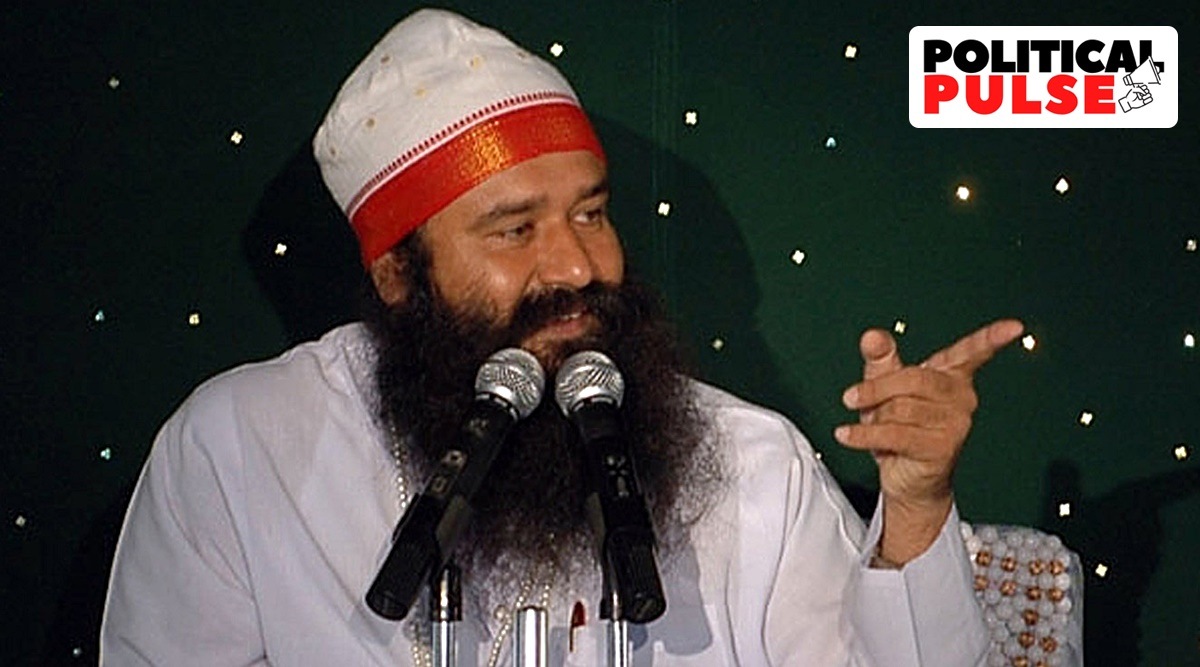Another set of polls near, Dera chief Ram Rahim gets parole
Haryana is scheduled to hold panchayat polls soon, for which nomination filing began today. Plus, the high-stakes Adampur bypoll is on Nov 3
 The Dera chief, first convicted in August 2017 by a Special CBI court at Panchkula, is currently serving a 20-year jail term for raping two of his women disciples at the Dera's headquarter in Sirsa. (Express archives)
The Dera chief, first convicted in August 2017 by a Special CBI court at Panchkula, is currently serving a 20-year jail term for raping two of his women disciples at the Dera's headquarter in Sirsa. (Express archives)
The controversial chief of Haryana’s Sirsa-based Dera Sacha Sauda, Gurmeet Ram Rahim Singh, was yet again released from jail before an election, this time on a 40-day parole from Rohtak’s Sunaria jail. After his release, he went straight to his dera based in Uttar Pradesh’s Baghpat under tight police cover.
Haryana is scheduled to hold panchayat polls soon, for which the nomination-filing process began today. Additionally, the high-stakes Adampur bypoll is scheduled for November 3. Hence, the timing of the Dera chief’s parole is raising eyebrows, despite the Haryana Minister of Jail (with additional responsibilities of Power and New and Renewable energy) Ranjit Singh saying that nothing much should be read into the move as “it is the entitlement of a convict to get parole”.
As per law, a convict is entitled to be released from prison on parole after he/she has completed one year of his/her conviction period.
The Dera chief, first convicted in August 2017 by a Special CBI court at Panchkula, is currently serving a 20-year jail term for raping two of his women disciples at the Dera’s headquarter in Sirsa. In 2019, Gurmeet and three others were convicted for the murder of journalist Ram Chander Chhatrapati in 2002. Last year, he received a third conviction along with four others, for hatching a conspiracy to kill the Dera’s former manager Ranjit Singh, who was shot dead, also in 2002.
The Dera chief had been earlier granted parole thrice in 2021 and twice in 2022—for 21 days in February and for a month in June. According to the prison authorities, a convict is entitled for a parole of 90 days every year, subject to clearances on his conduct and security clearances from the district administration where s/he would be staying during the period of his/her parole.
But the period of parole is not counted towards the sentence s/he is supposed to be serving. Explaining a convict’s entitlement for parole in relation with the duration of imprisonment, a senior Haryana police officer said, “The Supreme Court, in the case State of Haryana vs Mohinder Singh in 2000, had ruled that when a prisoner is on parole, his period of release does not count towards the total period of the sentence, while if he is on furlough, he is eligible to have the period of release counted towards the total period of the sentence undergone by him.”
The timing of the Dera chief’s repeated releases keeps raising eyebrows. On February 7, he was granted furlough just 21 days before the Punjab Assembly polls on February 20. At that time, Haryana chief minister Manohar Lal Khattar had refuted any relation between Gurmeet’s release and the Punjab assembly polls. “The convict has been granted furlough as there is a provision for the same in law. There is no connection with the Punjab polls and it is just a coincidence,” Khattar had said at the time.
Once again, he came out on a 30-day parole in June. At the time, SGPC president Harjinder Singh Dhami had condemned the Haryana government for releasing him repeatedly. “On the one hand, the government is not releasing Sikh prisoners even after they have completed their jail terms. On the other, Gurmeet Ram Rahim, who is serving imprisonment for heinous cases such as rape and murder, is getting released from jail time and again,” Dhami had said.
But it is not that the Dera chief has been getting paroles as and when he wants. In June 2019, he was made to withdraw his parole plea after the Haryana government was cornered by Opposition parties for ‘favouring’ him. At the time, he had sought a 42-day parole to tend to his farm in Sirsa.
In February this year, he was provided Z-plus security cover during his 21-day furlough, due to a “high-level threat to his life from pro-Khalistani elements”. He continues to enjoy Z-plus security cover as and when he is allowed to step out of prison.
Since prisons are a state subject, it is the prerogative of the state government to release a convict on furlough or parole, provided the latter fulfills all requisite conditions. Explaining the matter, another senior officer said, “Prison is a state subject under the Seventh Schedule of the Constitution. The management and administration of prisons fall exclusively in the domain of state governments, and are governed by the Prisons Act, 1894, and the Prisons Manual of respective state governments. According to the Prisons Act, states can make rules regarding release of prisoners on furlough, parole and remission, as part of their correctional process in jail reforms. MHA had also released a comprehensive Model Prison Manual in 2016 on all aspects of prison administration, and requested state governments to review existing rules and procedures on parole, furlough and remission.
“Both furlough and parole are a form of conditional release. The convict is supposed to follow the conditions set out in the order allowing furlough or parole. Generally, furlough is considered as a right of a prisoner to fulfill the objective of breaking the monotony of imprisonment and allowing the inmate to maintain contact with the outside world. Parole, on the contrary is granted for specific reasons – for instance death of a relative, to attend marriage of a family member or any other pressing reason, subject to the prisoner’s good behaviour. Both parole and furlough can be denied if the competent authority is of the opinion that releasing s/he would not be in the interest of society,” another officer explained.
The Dera chief had been getting out of prison on parole or furlough for various reasons even before 2019, including to meet his ailing mother and family members, or for medical examination, etc.
- 01
- 02
- 03
- 04
- 05































